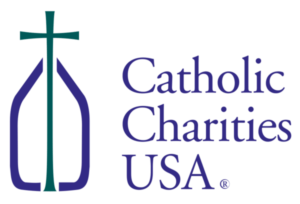Program Name
What does it provide?
Who does it help?
How to apply

- Addiction treatment programs
- Counseling
- Domestic violence victim services
- Emergency financial assistance
- Employment assistance
- Food pantries
- Housing support
- Immigration & Refugee Assistance
- In-home visitation
- Job skills development
- Mental health services
- Older Adults Support: Assistance with daily living activities, social programs, transportation
- Parenting education workshops
- Social workers and counselors working directly with students
- Support groups
- WIC
Those in need, regardless of religious affiliation, including:
- Children and youth
- Families
- Immigrants and refugees
- Individuals with physical or mental disabilities
- Low-income individuals and families
- Seniors
- Victims of domestic violence
Contact your local office
Bring your documents
Catholic Charities offers a wide range of services, varying slightly depending on the specific location and its needs.
While Catholic Charities stems from the Catholic Church’s teachings on compassion and service, being Catholic is not a requirement to access their services. In fact, one of their core principles is to help anyone in need, regardless of their faith, background, or affiliation.
Some common areas of focus include:
Basic Needs and Housing
Emergency food assistance: Food pantries, meal programs, and grocery assistance.
Shelter and housing services: Emergency shelters, transitional housing, affordable housing programs, and rent or mortgage assistance.
Utility assistance: Help with paying for electricity, water, and heating bills.
Family and Children:
Childcare and early education: Preschools, after-school programs, and summer camps.
Adoption and foster care: Services for families seeking to adopt or become foster parents, as well as support for children in foster care.
Parenting classes and support groups: Resources for parents facing challenges such as single parenthood, domestic violence, or substance abuse.
Youth programs: Mentoring programs, recreational activities, and job training for teenagers.
Seniors and Disabilities:
Meals on Wheels: Delivering hot meals to homebound seniors.
In-home care: Assistance with daily activities such as bathing, dressing, and medication management.
Adult day care: Socialization and activities for seniors in a safe and supervised environment.
Disability services: Support for people with disabilities to help them live independently.
Other Services:
Immigration services: Legal assistance and support for immigrants and refugees.
Counseling and mental health services: Individual and family therapy, addiction treatment, and support groups.
Job training and employment assistance: Help with finding a job, writing a resume, and developing job skills.
Disaster relief: Providing food, shelter, and other assistance to victims of natural disasters.
Legal services: Providing legal aid to low-income individuals and families in matters such as housing, immigration, and family law.
Financial literacy and counseling: Helping people manage their money, budget effectively, and avoid debt.
Transportation assistance: Providing rides to medical appointments, grocery stores, and other essential services.
Veteran services: Supporting veterans and their families with housing, mental health care, job training, and other needs.
Prison ministry: Providing spiritual and emotional support to inmates and their families.
Advocacy and social justice: Working to change laws and policies that are unfair or harmful to the poor and vulnerable.
Education and workforce development: Equipping individuals with the skills and knowledge they need to get a good job, such as GED preparation, job training programs, and career counseling.
Environmental stewardship: Promoting sustainability and caring for the environment through initiatives like community gardens, recycling programs, and educational workshops.
Arts and culture programs: Offering creative outlets and fostering community engagement through music, theater, dance, and visual arts programs.
Disaster preparedness and response: Helping communities prepare for and recover from natural disasters through education, resource distribution, and volunteer coordination.
Interfaith collaboration: Partnering with other faith-based organizations and community groups to address shared challenges and provide comprehensive support to those in need.
Applying for services
The process for applying for services at Catholic Charities will vary depending on the specific service you’re interested in and your location. However, here are some general steps you can follow:
- Contact your local Catholic Charitiesoffice: This is the best way to find out what services are available in your area and how to apply. You can find their website or phone number online or by asking at your local Catholic church.
- Get an initial assessment: When you contact Catholic Charities, they will likely conduct an initial assessment to determine your needs and eligibility for services. This may involve providing some basic information about your situation and household.
- Complete any necessary paperwork: Depending on the service you’re applying for, you may need to complete some paperwork, such as an application form or proof of income.
- Meet with a case manager: If you’re eligible for services, you may be assigned a case manager who will work with you to develop a plan to meet your needs. This plan may include referrals to other agencies or programs, as well as direct assistance from Catholic Charities.
Additional Resources:
Here are some tips for applying for services:
Be prepared to provide personal information: This may include your name, address, phone number, income, and household members.
Be honest and upfront about your needs: The more information you can provide, the better Catholic Charities can help you.
Be patient: The application process may take some time.
Ask questions: Don’t be afraid to ask questions about the services you’re applying for.
If you haven’t heard back from Catholic Charities within a reasonable amount of time, follow up with them to check on the status of your application.
Finding Local Services:
The best way to find out what services are available in your area is to contact your local Catholic Charities office. You can find their website or phone number online or by asking at your local Catholic church.
Here are some additional resources:
